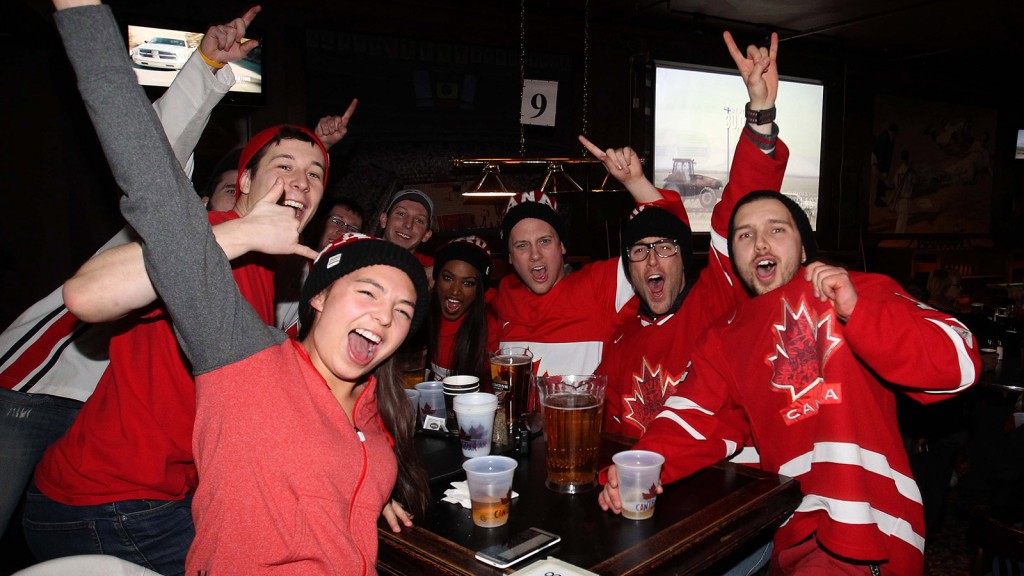Let’s all drink until dawn
Canadians aren’t the coolest kids on the block, and our early-closing bars are to blame
Hot Rod buffs had no shortage of classics to look at like this 1962 Chev Corvette during the 48th Annual World of Wheels at the BMO centre which runs until Sunday in Calgary, Alta. on Sunday February 23, 2014. Darren Makowichuk/Calgary Sun/QMI Agency
Share

In 2011, a social networking website called Badoo conducted a survey about the perceived “coolness” of various nationalities around the world. Its results were unsurprising: respondents ranked Americans the coolest people on earth, followed by Brazilians, the Spanish and Italians. The Belgians, Poles and Turks, meanwhile, took gold, silver and bronze on the survey’s corresponding “uncool” list. Where did we rank? In fourth, right behind them. That’s right: so uncool are Canadians that we failed to place in the top three on the uncool list—a distinction that could have been at least, ironically cool, in a hipster sort of way. When the survey results were released, Badoo’s director of marketing, Lloyd Price, told Reuters that America ranked coolest because its celebrities are the most well-known internationally. The uncool countries, he argued, just didn’t have enough star power to make the cut. (Justin Bieber may be universally recognizable but he is not, contrary to his recent Instagram activity, the modern James Dean.)
Price was probably right to an extent, but there may be another reason behind Canada’s perceived lack of cool; one that has little to do with a dearth of world superstars, and a lot to do with our bars. The great cities of the world’s coolest countries do not sleep. Most of our cities, however, are in bed by 2:30 a.m., thanks to “last call” liquor laws that dictate the annoyingly early hour at which a licensed establishment must stop serving booze. In metropolises like New York City, Tel Aviv and Hong Kong, nightlife doesn’t adhere to an early-to-bed bar curfew. But in many of Canada’s urban centres—cities like Toronto, Calgary and Halifax—it is nearly impossible to party at a licensed establishment in the middle of the night. There are some exceptions to this rule of institutionalized lameness, including Newfoundland where last call is 3 a.m., ditto for Vancouver and Montreal; Montreal’s mayor would like to see drinking hours extended to 6 a.m. (Quebec may have its fair share of highly uncool cultural markers: xenophobia, voter suppression, Just for Laughs gags. But at least its people know how to party.)
Hopefully soon, Toronto, Calgary and Edmonton will follow suit. In late February, Alberta relaxed its last-call rules for the Sochi Olympic men’s gold-medal hockey final, enabling Albertans to watch the game at a bar in the early hours of the morning. Toronto did the same thing under Section 62 of the Liquor Licence Act, which permits the city to extend “the hours of [alcohol] sale during events of municipal, provincial, national or international significance.” None of the cities self-destructed as a result.
Police in Calgary and Edmonton weren’t overwhelmed with outbreaks of crime when Albertans walked out of their bars drunk and happy after Canada beat Sweden in the gold-medal game. In fact, so successful was the temporary liquor law relaxation in Alberta, for businesses and patrons alike, that provincial Finance Minister Doug Horner said he’d work with Alberta Gaming and Liquor Corp. to review the law. This is exactly what Jeff Tchadjeu and Chris Spoke, two Toronto activists, would like to see occur in Canada’s largest city, where they’ve started LastCallTO, an online movement and petition—with 4,000 signatures and counting—advocating for a 4 a.m. last-call time in Toronto. Tchadjeu argues that a later last call would likely prevent binge drinking because rowdy bar patrons would feel less pressure to overindulge before the 2 a.m. marker, and illegal after-hours venues—many rife with hard drug use—would wane in popularity. (In 2012, Fredericton bar owners complained that the city’s 2 a.m. “hard cut-off” was pure chaos, because patrons would pour into the streets all at once, wasted.) If New York City isn’t “falling apart,” says Tchadjeu, “I don’t see why Toronto would.”
It wouldn’t, because time of night—or day—is irrelevant where inebriated hooliganism is concerned. The Vancouver hockey riots of 2011 broke out well before midnight and, according to police filings, Toronto Mayor Rob Ford (who opposes LastCallTO) smoked what looked like crack with known drug dealers in the middle of the afternoon on Family Day last year. Those opposed to later last-call times, including Andrew Murie, the CEO of Mothers Against Drunk Driving, believe that later legal drinking hours may contribute to increased incidents of impaired driving (70 per cent of people charged with impaired driving offend shortly after frequenting a licensed establishment). Yet Statistics Canada research released last year shows that Quebec, despite its later last-call times, has the second-lowest rate of impaired driving incidents in the country. The correlation between frequenting a bar after two in the morning and driving drunk simply isn’t there.
Extended drinking hours are, in the end, completely in sync with Canada’s civilized, squeaky-clean image. We tend to pace ourselves and we’re proudly very polite. We aren’t a nation of brutish teenagers deserving of a 2 a.m. curfew. Would that our liquor laws represented that fact.